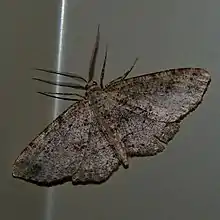Hesperumia latipennis
Hesperumia latipennis is a moth of the family Geometridae first described by George Duryea Hulst in 1896. It is found in western North America from British Columbia south to California.
| Hesperumia latipennis | |
|---|---|
 | |
| Scientific classification | |
| Kingdom: | |
| Phylum: | |
| Class: | |
| Order: | |
| Family: | |
| Genus: | |
| Species: | H. latipennis |
| Binomial name | |
| Hesperumia latipennis (Hulst, 1896) | |
| Synonyms | |
| |
The wingspan is 34–36 mm. The forewings are pale gray with a narrow dentate median line and numerous scattered brown scales. The hindwings are similar in color and pattern. Populations from the Cascade Range tend to be slightly grayer and have more clearly defined maculation (spots) than specimens from the coastal areas of British Columbia, Washington and central California.
Adults are on wing from May to August.
The larvae feed on various trees and shrubs, including Rhamnus purshiana, Holodiscus discolor, Sambucus species and Symphoricarpos albus.[1]
References
- Davis, John (June 15, 2014). "Species Hesperumia latipennis - Hodges#6433". BugGuide. Retrieved February 6, 2019.
External links
- "910847.00 – 6433 – Hesperumia latipennis – (Hulst, 1896)". North American Moth Photographers Group. Mississippi State University. Retrieved February 6, 2019.
This article is issued from Wikipedia. The text is licensed under Creative Commons - Attribution - Sharealike. Additional terms may apply for the media files.